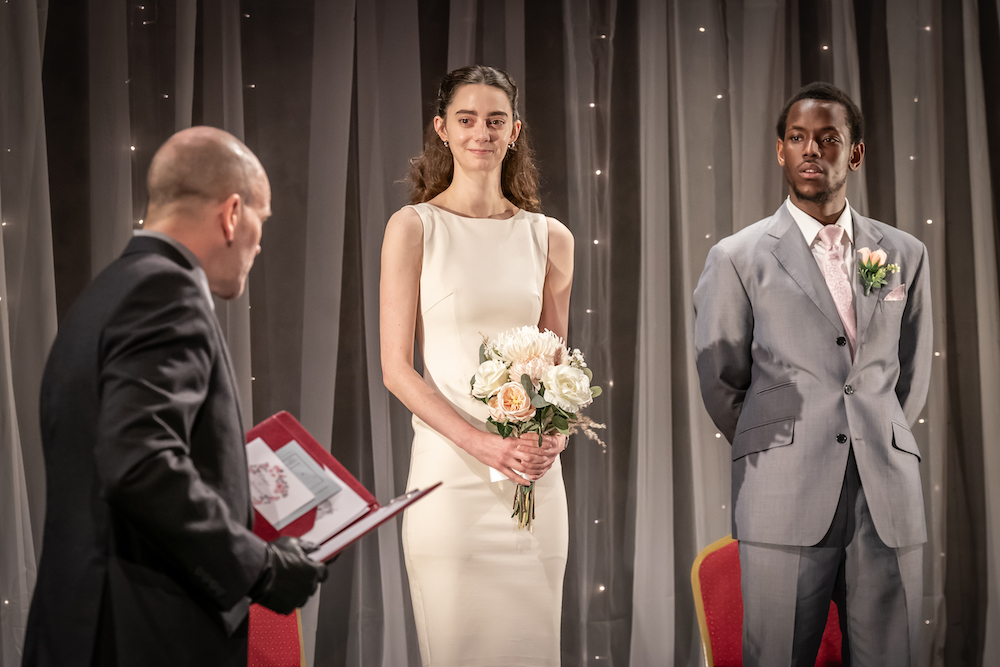This is a play about censorship in a totalitarian state – but, no, I’m not reviewing The Pillowman again. Instead, I’m watching A Mirror by Sam Holcroft, a playwright who – as her 2015 play Rules for Living amply illustrated – is interested in playful games with the idea of theatricality.
This time, she explores ideas about fact and fiction in a tricksy story set in a repressive regime whose Almeida Theatre production stars the always watchable, and highly bankable, Jonny Lee Miller.
The plot is about Mr Čelik (Miller), director of the Ministry of Culture in a dystopian no-place, whose job is to censor art. When a young car mechanic, Adem, writes a play about everyday life in his poor high-rise flats, Čelik objects to its realistic depiction of impoverished social conditions, but nevertheless wishes to promote fresh talent (yes, you do have to suspend a lot of disbelief here) so he invites him in. Čelik organises a playwriting workshop with the support of established state-friendly writer Bax, and of Mei, a new assistant at the ministry. In a couple of scenes, which mix comedy with ideas about art, Adem’s ability to faithfully reproduce word-for-word any dialogue that he has ever heard (about as creative as a voice memo) is explored to its tragic conclusion.
The first problem with A Mirror – whose title alludes of course to Hamlet and whose characters have names suggesting a variety of repressive regimes around the world – is its framing device. The whole of the Almeida theatre has been decked out with garlands of flowers, party lights, public service notices, tables of food and drink, orders of service, and red plush chairs, in order to fool the regime’s police into thinking that a wedding (pictured below with Miller, Tanya Reynolds and Micheal Ward) is taking place rather than an unofficial theatre performance. This immersive piece of business, which is sustained in great detail for the entire evening, is frankly unnecessary and quickly becomes tedious. It also extends the running time of the 90-minure play-within-a-play to two hours. The second problem is the characterisation. From the beginning Adem is written as implausibly naïve and Čelik is almost ridiculously charming, articulate and interested in the potential of art to change lives. There may well be ministry of culture administrators who secretly love forbidden plays like Romeo and Juliet, and want to share them with their secretaries, but I find this frankly unbelievable. Most censors want to maintain social order, not develop new talent, especially when it is clearly unsuitable to the needs of the regime. Okay, this set up is a play-within-a-play, but it’s still wearyingly unconvincing and preposterous.
The second problem is the characterisation. From the beginning Adem is written as implausibly naïve and Čelik is almost ridiculously charming, articulate and interested in the potential of art to change lives. There may well be ministry of culture administrators who secretly love forbidden plays like Romeo and Juliet, and want to share them with their secretaries, but I find this frankly unbelievable. Most censors want to maintain social order, not develop new talent, especially when it is clearly unsuitable to the needs of the regime. Okay, this set up is a play-within-a-play, but it’s still wearyingly unconvincing and preposterous.
Likewise, there is something badly wrong with a play about censorship, which is staged in a liberal borough of London, that fails to address the real issues of today: self-censorship, fear of cancel culture and financial constraints on creativity. Instead, we are presented with a simplistic binary of pessimistic realism versus optimistic government propaganda, which is repeated again and again. So despite some brightly satirical points and some fun scenes of play reading and acting (hilarious extracts of a couple of war plays), the evening is better at nodding towards sexual politics than it is at examining the issue of censorship and artistic freedom.
In the playtext, Holcroft says that she was inspired to write her play by a visit to Lebanon in 2014, where the writer and film-maker Lucien Bourjeily has resorted to staging clandestine performances because of the state’s strict censorship rules. Although A Mirror is not a documentary but a fantasy, it lacks a sense of danger – despite a rather horrific ending – that the victims of truly repressive regimes must feel. At no point is the liberal audience that frequents this venue actually challenged, either intellectually or emotionally. Serious politics become a middle-class divertissement.
Still, if you want to see Miller in the flesh this show is definitely a must: he dominates the stage with his charismatic strong-man presence, a beguiling mix of sinister leather gloves and manipulative bonhomie. Jeremy Herrin’s production – designed by Max Jones – has a finely uneasy air, and the rest of the cast – Micheal Ward (making his stage debut as Adem), Tanya Reynolds (Mei) and Geoffrey Streatfeild (Bax) – perform well in spite of the text. I think the onstage musician, Miriam Wakeling, plays well, but is rather redundant. And it’s a pity that a play about truth is so lacking in, well, truthfulness.















Add comment